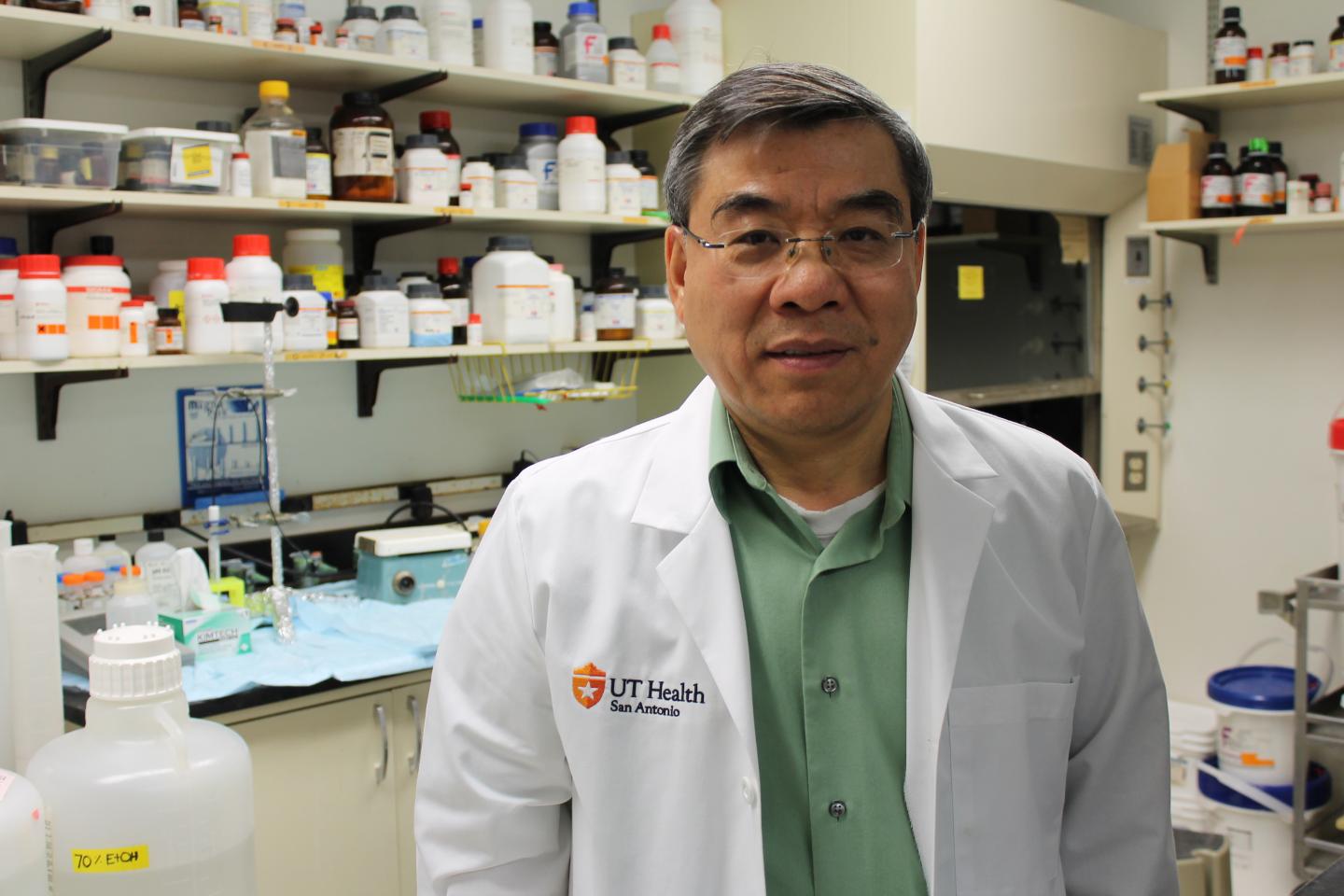
Credit: UT Health San Antonio
San Antonio, Texas, USA – Exposing the gut to chlamydia protects against subsequent infection in the genital tract and other tissues, researchers from UT Health San Antonio discovered. Chlamydia is the nation's most common sexually transmitted disease and causes infertility, ectopic pregnancy and pelvic inflammatory disease if left untreated.
"This research emphasizes the pre-exposure of chlamydia to the gastrointestinal (GI) tract as a vaccine," said Guangming Zhong, M.D., Ph.D., professor in the Joe R. & Teresa Lozano Long School of Medicine at UT Health San Antonio.
The protection is very robust and is across tissues, which is called transmucosal immunity. Protected sites include the genital tract and the lungs, said Dr. Zhong, whose faculty appointment is in the Department of Microbiology, Immunology & Molecular Genetics.
The discovery, reported Nov. 13, 2017, in Infection and Immunity, indicates that exposing the gut first to chlamydia is a novel avenue to explore in preventing the genital infection. However, when the genital tract is the site of initial chlamydia exposure, a different outcome may result. In this scenario, genital chlamydia spreads to the gut and induces responses that promote further disease in the genital tract. Dr. Zhong hypothesized this disease pattern in a review article published Dec. 27, 2017, in Trends in Microbiology.
Controlled transmission
Human exposure to chlamydia is unpredictable, perhaps coming through genital or non-genital sexual contact with an infected partner and perhaps via contact with contaminated materials. The UT Health San Antonio scientists are utilizing a mouse model that is a controlled way to study chlamydia transmission.
The team found that if the gut is the first site to be colonized by chlamydia bacteria, then the mice are immunized against further disease. The gut infection is benign. But if the genital tract is the first to be infected, the resulting disease is harmful. This results in a worse disease prognosis, including the possibility of infertility because the disease is advanced before symptoms are evident.
"If you are exposed to chlamydia in the GI tract first, it's a vaccine, but if you are exposed in the genital tract first, you may have enhanced disease," Dr. Zhong said.
A probiotic for the gut
Dr. Zhong is exploring the possibility that Chlamydia trachomatis, the bacterium that causes chlamydia, could be delivered orally as a vaccine.
"We take probiotics for our GI health," Dr. Zhong said. "In the future, we may add chlamydia as a probiotic for the gut. Once the bacteria are established in the GI tract, they don't spread."
About 1.6 million cases of chlamydia were reported to the U.S. Centers for Disease Control and Prevention in 2016. Because many individuals have no symptoms and don't get tested, the number of annual cases is estimated to be as high as 2.8 million.
Chlamydia is especially common among young people, and the CDC estimates 1 in 20 sexually active young women age 14-24 have the STD.
###
Dr. Zhong joined The University of Texas Health Science Center, now called UT Health San Antonio, in 1999. He has served as a scientific co-director for the Vaccine Development Center of San Antonio since 2012.
Commercialization
Dr. Zhong is the inventor on pending patent applications in the United States, Canada, Europe, Mexico and South Africa related to chlamydia prevention and vaccine delivery. In 2017, The University of Texas System Office of Innovation and Strategic Investment agreed to support nationalization of the intellectual property in the patent application through the UT System Patent Nationalization Fund. UT Health San Antonio's Office of Technology Commercialization (OTC) is actively pursuing partners to expedite the product development of this innovation. Interested entities should contact OTC directly at (210) 562-4000.
The University of Texas Health Science Center at San Antonio, with missions of teaching, research and healing, is one of the country's leading health sciences universities and is now called UT Health San Antonio™. UT Health San Antonio's schools of medicine, nursing, dentistry, health professions and graduate biomedical sciences have produced more than 33,000 alumni who are advancing their fields throughout the world. With seven campuses in San Antonio and Laredo, UT Health San Antonio has a FY 2018 revenue operating budget of $838.4 million and is the primary driver of its community's $37 billion biomedical and health care industry. For more information on the many ways "We make lives better®," visit http://www.uthscsa.edu.
Media Contact
Will Sansom
[email protected]
210-567-2579
@UTHealthSA
http://www.uthscsa.edu/hscnews
Original Source
https://news.uthscsa.edu/study-site-1st-chlamydia-exposure-makes-big-difference/ http://dx.doi.org/10.1128/IAI.00630-17





